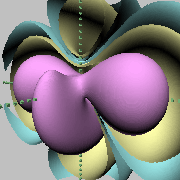 Animation of an excited state of Hydrogen, by Drexel student Glenn Winship.
Animation of an excited state of Hydrogen, by Drexel student Glenn Winship.
 Animation of an excited state of Hydrogen, by Drexel student Glenn Winship.
Animation of an excited state of Hydrogen, by Drexel student Glenn Winship.
Announcements
Course Meetings
Syllabus
Course Description and Philosophy
Course Outline
Course Learning Outcomes
Textbook and Reading Assignments
Extra Notes
Grading
Problem Sets
Exams
Course Schedule
Course rules of conduct
Welcome to the home page of QM I. This web page is also the syllabus for the course. See the Blackboard Learn site for this course for details about assignments and exams. Changes to this syllabus will be announced by email to enrolled students.
I will post a password-protected link to Zoom on the Drexel Learn site, to be used for remote office hours or for lectures in the event that we cannot meet in person.
In this first quarter of our three part sequence on QM, you will study the basic equations, discussed the similarities and differences between the classical and QM descriptions, and solve some simple, typically one-dimensional problems. In the second quarter, we'll move on to three dimensional problems, and the QM description of the Hydrogen atom, from which you could first see how the QM formulation yields accurate predictions of the observed phenomena, and begin study of multi-particle systems and perturbation theory. In the final quarter, we'll delve into more advanced topics include time-dependent perturbation theory (interaction of matter and light), the variational principle, scattering theory, the EPR paradox, Bell's Theorem, and a deeper look at the interpretation of QM.
See the course outline above for the chapters that correspond to the material covered in this course.
Final grades will be assigned following the usual correspondence between percentage scores and letters: 90-100 is A- to A+, 80-89 is B- to B+, etc. However, there may be a positive curve, which means that your letter grade could be higher than in the normal grading scheme (e.g., a 90 is at least an A-).
You may discuss the homework with your classmates, but you and you alone are responsible for the work that you turn in. Please write up your own solutions to the problems. Breaches of this policy will result in homework scores being divided by the number of ``participants.'' Second offenses may result in failure (of the class).
You must give the full citation of any outside source that you employ in your solutions. Use of solutions to these problems from previous years or from other outside sources (including web pages that you find by googling for solutions to Griffiths) constitutes plagiarism and may result in failure (of the course).
Problem sets must be submitted using Blackboard Learn by the due date and time as a legible PDF file (leave extra time to make a single easily readable PDF of your work). Do not send by email. See Blackboard Learn site for problem set assignments.
The final exam will during the final exam week (date/time TBA).
Typical format for both exams is half closed and half open book. "Open book" means that you may consult your own notes, your own homework, solutions and handouts that I have provided, and the assigned textbook.
| Week | Class Dates | Reading | Homework | Exams |
| 1 | September 24, 26 | 1.1-1.6 | ||
| 2 | October 1, October 3 | 2.1, 2.2 | HW1 | |
| 3 | October 8, 10 | 2.3, 2.4 | HW2 | |
| 4 | October 15, 17 | 2.5 | HW3 | |
| 5 | October 22, 24 | 2.6 | HW4 | |
| 6 | October 29, 31 | 3.1 | Midterm exam | |
| 7 | November 5, 7 | 3.2, 3.3 | HW5 | |
| 8 | November 12, 14 | 3.4, 3.5 | HW6 | |
| 9 | November 19, 21 | 3.6 | HW7 | |
| 10 | November 26 (no class 11/28 - Thanskgiving break) | |||
| 11 | December 3, December 5 | Finish through ch. 3, Review Session | HW8 | |
| 12 | December 9-13 Exam Week | Final Exam |
Most of this is common sense, but some folks need a gentle reminder.
Electronic distractions: Silence your cell phone. Turn off notifications on your phone and computer so that they don't pop up and distract you.
Food: Our class meetings are at lunchtime and everyone has to eat sooner or later. So eat if you must. Thankfully, we don't yet have Smellivision.
Plagiarism: Use your own very large brain (you're a physicist!) and
don't even think about cheating.
The usual University rules apply. By
stepping into the classroom, you agree to abide by Drexel's policy on
Academic Integrity (www.drexel.edu/provost/policies-calendars/policies/academic-integrity/)
Students with disabilities requesting accomodation and services at Drexel University need to present a current accomodation letter (AVL) to faculty before accomodations can be made. This cannot be done retroactively. AVL's are issued by the Office of Disability Services (ODS). For additional information, contact ODS at www.drexel.edu/ods 3201 Arch St., Suite 210, 215-895-1401 (V), or 215-895-2299 (TTY).
Course
Add/Drop Policy (www.drexel.edu/provost/policies/policies-calendars/course-add-drop)
Course
Withdrawal Policy (www.drexel.edu/provost/policies-calendars/policies/course-withdrawal)
Drexel Student Code of Conduct (www.drexel.edu/studentlife/community_standards/code-of-conduct/)
Course Syllabus Change policy: Details of this syllabus are subject to
change at any time. Please pay attention to announcements during
class and email from the instructor. All changes will be announced in
writing by email sent to all registered students.
Last update: September 6, 2024